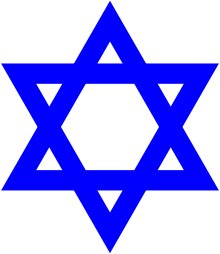Anjuvannam
Anjuvannam (Anjuvannan for a person in the community) typically refers to the Jewish community/colony (corporation/guild) at Cochin (Cochin Jews), southern India. In the past, Anjuvannam was also a guild of West Asian traders that included Jewish, Syrian Christian and Muslim traders operating in South India and South East Asia.[1]

Etymology
According to one explanation, the title derives from the ancient Hindu varna system of social division, as any person not belonging to one of the four varnas (Brahmin, Kshatriya, Vaishya and Shudra) was referred to as an Anjuvannan. The word comes from the Tamil words anju (five/fifth) and vannam or varnam (varna). However, some historians have challenged this explanation.[2][3]
An alternative explanation traces the origin of the name to the Avestic word Hanjumana and Persian word Anjuman or Anǰoman[4] that refers to an organisation or association of people. [3]
Relevance to history of Kerala Jews
Since the 11th century AD, the term was used in India to refer primarily to a merchant community of Jews in Malabar, whose leader was granted land rights by Cera king. [3][5] He authorized Issuppu Irappan (interpreted to be Joseph Rabban, a prominent Jewish merchant chief on the Malabar Coast) to own, inhabit, trade and prosper on an exclusive land at the port of Cranganore, near Cochin. [6][7]
Modern usage
From the 18th century onwards, the term Anjuvannam is not in common use and considered archaic.
Anjuvannam as a West Asian trading guild
Indologist Y. Subbarayalu had defined Anjuvannam guild as a "body of west Asian traders".[1][8][9] The guild consisted of traders from West Asian communities such as Jews, Syrian Christians and Muslims who operated in the trading ports of Malabar and Coromandel Coast of South India and even in South East Asia including Java.
See also
References
- 1 2 Kulke, Hermann; Kesavapany, K.; Sakhuja, Vijay (2009). Nagapattinam to Suvarnadwipa: Reflections on the Chola Naval Expeditions to Southeast Asia. Institute of Southeast Asian Studies. ISBN 9789812309372.
- ↑ Logan, William (1887). Malabar Manual. Asian Educational Services. ISBN 9788120604469.
- 1 2 3 History of People and Their Environs: Essays in Honour of Prof. B.S. Chandrababu. Bharathi Puthakalayam. 2011. ISBN 9789380325910.
- ↑ electricpulp.com. "ANJOMAN (Organization) – Encyclopaedia Iranica". www.iranicaonline.org. Retrieved 2018-01-11.
- ↑ Matlock, Gene (2000). India Once Ruled the Americas!. iUniverse. ISBN 9780595134687.
- ↑ Pius., Malekandathil, (2010). Maritime India : trade, religion and polity in the Indian Ocean. Delhi: Primus Books. ISBN 9380607016. OCLC 551379069.
- ↑ "Steeped in Jewish history: The Kerala relics Modi gifted to Netanyahu on his maiden Israel visit". The News Minute. 2017-07-05. Retrieved 2018-01-10.
- ↑ Y. Subbarayalu (2015-06-01). "Trade guilds of south India up to the tenth century". Studies in People’s History. 2 (1): 21–26. doi:10.1177/2348448915574403. ISSN 2348-4489.
- ↑ Subbarayalu, Y. (2011-12-22). South India Under the Cholas. OUP India. ISBN 9780198077350.
External Links
- A talk on YouTube from Indologist Subbarayalu about the Anjuvannam trading guild
